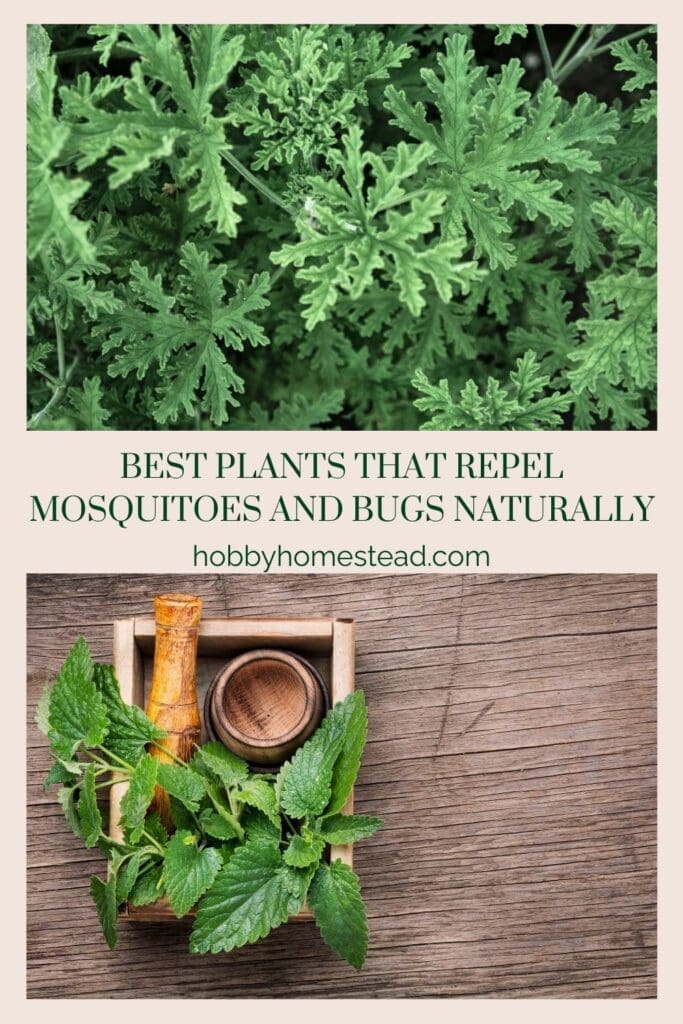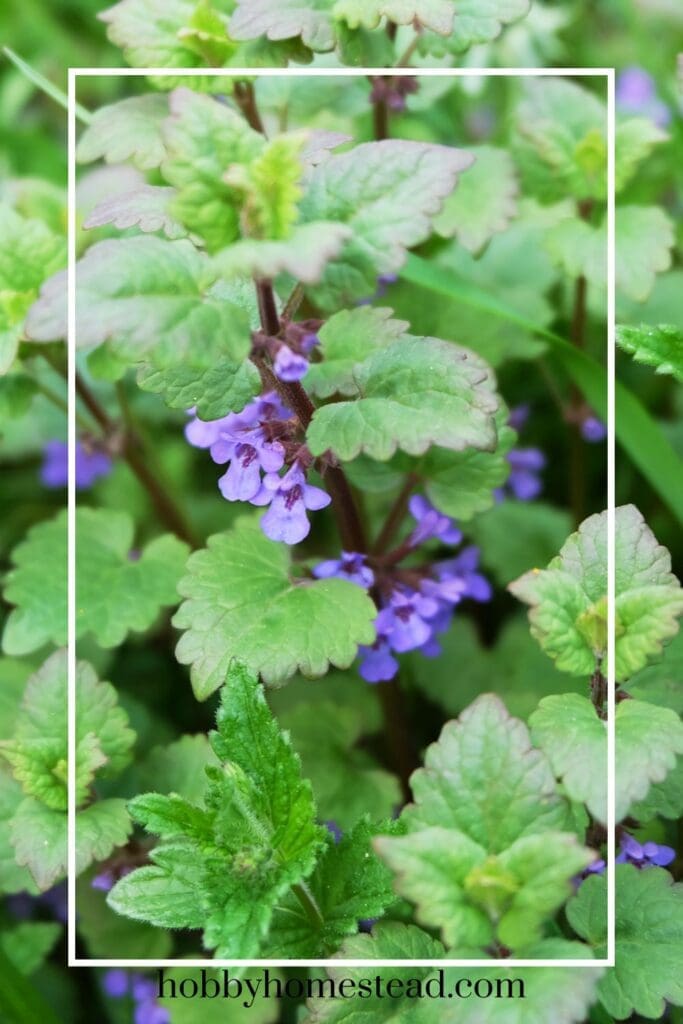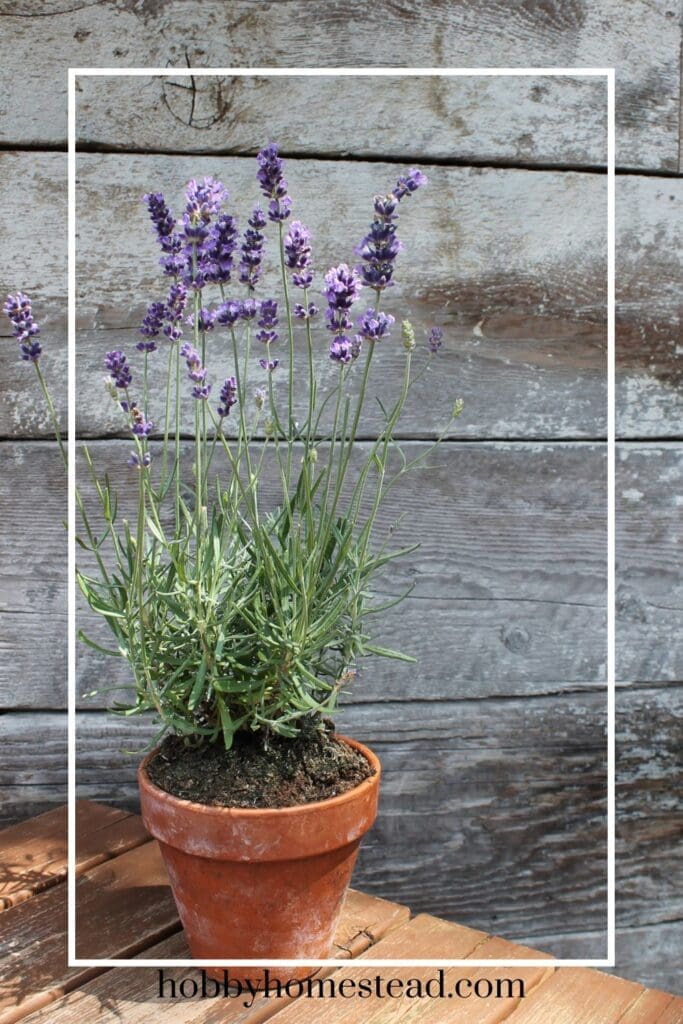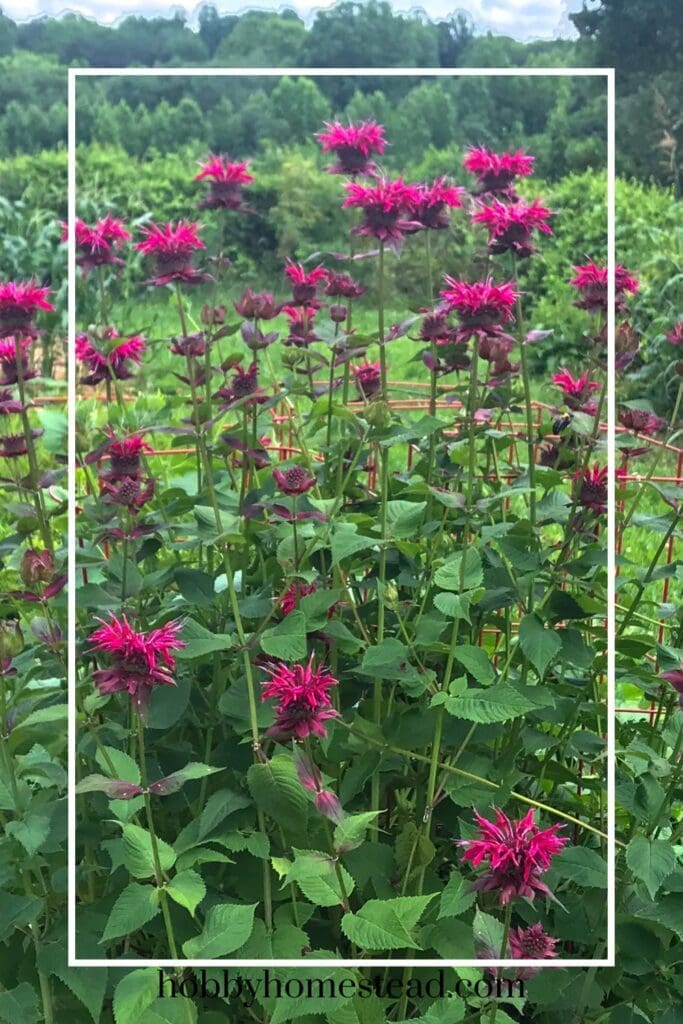Why use plants that repel mosquitoes and bugs naturally? Mosquitoes are more than just a nuisance on the homestead—they can leave behind itchy bites that swell into painful welts for some of us.
A few of our family members react pretty badly, so we’re always looking for natural mosquito repellents that keep the bugs away without relying on chemical bug sprays. The good news? Nature already offers a long list of plants with powerful insect-repelling properties that you can grow right in your outdoor space.

Creating a Mosquito-Free Homestead
The best option for a mosquito-free homestead is a layered approach: grow the best plants for repelling mosquitoes, remove breeding areas like standing water, and consider gentle additions like citronella candles, homemade sprays with essential oils, or even carnivorous plants to help reduce the mosquito population.
Whether you’re creating a cozy seating area, prepping for backyard barbecues, or simply trying to enjoy a peaceful evening outside, the best plants for the job do more than look pretty—they double as natural insect repellents. Here’s our go-to guide.
Why Use Plants to Repel Mosquitoes?
Most commercial bug sprays use synthetic versions of the same volatile oils found in nature. The strong scent and active ingredient in many insect-repellant plants—like citronella grass or lemon balm.
This can overwhelm a mosquito’s sense of smell, which they rely on to find us by tracking the smell of the carbon dioxide we exhale or the heat from our warm bodies.
By choosing natural chemical solutions in the garden, you’re also creating a more animal-friendly area and avoiding harm to furry friends, pollinators, or even swallowtail butterfly caterpillars that might live in your herb beds.

Best Plants to Repel Mosquitoes and Insects Naturally
Here’s a curated list of plants with real insect-repelling power. Most thrive in full sun, love well-drained soil, and add beautiful blooms and fragrance to your space.
1. Citronella Grass (Cymbopogon nardus)
Often confused with the citronella plant (pelargonium citrosum), citronella grass is the real deal when it comes to repelling mosquitoes. It has a strong aroma and is a prime choice for patios and pathways. It’s also the main ingredient in many citronella candles and natural mosquito repellents.
2. Lemon Balm (Melissa officinalis)
A member of the mint family, lemon balm has a refreshing scent and is great in teas too! This versatile herb grows well in garden beds and releases chemical nepetalactone, a known natural insecticide. It’s also a great way to attract pollinators while keeping bugs away.
3. Catnip (Nepeta cataria)
Research from Iowa State University shows that catnip can be more effective than DEET in some cases. It’s a natural repellent that contains chemical nepetalactone and makes an excellent addition to herb gardens. Just keep it in a cat-friendly area!

4. Lavender
Known for its beautiful plants and pungent smell, lavender contains essential oils that repel mosquitoes, moths, and flies. It also makes a lovely border plant and is a calming addition near any outdoor space.
5. Marigolds
These annual flowers are often used as a natural barrier around vegetable beds. The strong mosquito repellent properties in marigolds come from pyrethrum. A natural insecticide that affects many types of insects.
6. Basil
Sweet basil, lemon basil, and even lemon thyme are excellent at keeping bugs away while serving double duty in the kitchen. Place pots near windows or outdoor tables for best results.
7. Scented Geranium (Pelargonium citrosum)
This lovely ornamental plant, sometimes called the mosquito plant, smells like citrus and is often used in containers. Be sure to look for van leenii cultivars for higher insect-repelling effectiveness.
8. Bee Balm (Monarda)
A beautiful, pollinator-friendly, mosquito-repelling plant. Bee balm is a member of the mint family that attracts bees and butterflies while repelling mosquitoes with its volatile oils.
9. Lemon Grass
Similar to citronella grass, lemon grass emits a strong lemony scent that bugs can’t stand. It’s an easy-to-grow tropical grass that adds height and interest to any small garden.
10. Eucalyptus Tree
The eucalyptus tree is a great source of essential oils and natural repellents. Its insect-repelling properties also make it helpful against mosquito larvae in damp areas.
11. Floss Flowers (Ageratum)
A bright bedding plant that contains coumarin, which is toxic to mosquitoes. These are best used in borders or mixed with other insect-repelling plants.
12. Neem Tree
The neem tree is widely used in Ayurvedic medicine and gardening for its natural insecticide qualities. Oils from neem leaves are often used in natural insect repellents for garden pests and mosquitoes.
13. Lantana Camara
This ornamental plant has clusters of colorful flowers and is known to deter mosquitoes. Be cautious though—lantana is toxic to pets, so it may not be the best option for everyone.
14. Carnivorous Plants
Venus flytraps, pitcher plants, and sundews don’t repel bugs—they eat them! If you have a real mosquito problem, these can be fun and effective additions to a small garden or indoor setup.

Best Ways to Use These Plants
- Plant them in strategic spots around porches, walkways, and near doors.
- Crush the leaves to release their essential oils and rub lightly on skin as a more natural alternative to bug spray (test a small area first).
- Make your own spray using infused oils from citronella, lavender, or eucalyptus.
- Use plants as part of a natural barrier near sitting areas or around decks.
Companion Planting for Better Results
One of the best ways to maximize the insect-repelling power of these plants is by using companion planting. Grouping several mosquito-repelling plants together strengthens their effect, thanks to the concentrated release of volatile oils.
- Plant lemon balm, lavender, and citronella grass near each other in a well-drained soil area that receives full sun.
- Add bee balm or basil around your seating area or porch steps.
- Use marigolds around garden beds to keep pests away from veggies while controlling mosquitoes.
This creates a natural barrier that protects your outdoor space from multiple types of insects while also enhancing your landscape with beautiful plants.
Do These Plants Really Work?
If you’re wondering whether a mosquito-repelling plant is strong enough to replace insect repellents entirely, the answer is: it depends. These natural repellents do work, but they’re most effective when combined with good mosquito control habits.
✅ Eliminate stagnant water, empty the pots
✅ Use mosquito dunks in ponds or rain barrels without covers
✅ Wear long sleeves during peak mosquito hours
✅Cleaning clogged gutters with stagnant water
✅Change the water in bird baths regularly. At least once a week.
✅ Consider making a spray using essential oils from your plants
Remember, many of these plants contain the same active ingredients found in commercial bug sprays, but in milder, plant-based form. You’ll get the best results when you grow them in abundance and apply multiple strategies.
Safety Tips for Pets and People
Most of these insect-repelling plants are safe, but some—like lantana camara—can be toxic if ingested by pets or small children. Always check before planting, especially in areas where your furry friend plays.
- Create a cat-friendly area with nepeta cataria (catnip), lemon balm, and basil.
- Avoid planting tagetes spp. and lantana camara where pets roam unsupervised.
- If using crushed leaves or oils on the skin, test a small patch first to prevent irritation.
These natural insect repellents are a more natural alternative to harsh chemicals, but it’s still smart to use them wisely.
It’s Worth the Effort
It may take a little effort, but the reward is enjoying your garden, porch, or outdoor space without dealing with itchy bites. From lemon verbena and eucalyptus trees to floss flowers and mosquito plants, nature offers everything you need for relief from summer pests.
With the right mix of natural repellents and common-sense maintenance like removing stagnant water, you can drastically reduce your mosquito problem.
From citronella grass to neem trees, you have plenty of natural options to help your family enjoy the outdoors again—itch-free and chemical-free.
So go ahead—plant a little beauty with a lot of insect-repelling power. Your skin (and your family) will thank you!


